Washoku, or traditional Japanese cuisine, is now a universal word, thanks to its registration on UNESCO’s Intangible Cultural Heritage list. With its use of natural and simple ingredients, washoku has attracted global recognition, resulting in more exports. Yet there is a gap between the image of washoku held by many people overseas and the essence of real washoku.
Two entrepreneurs, Lillian Rowlatt and Aki Sugiyama, are helping to fill in that gap by sending authentic washoku around the world and also to people in Japan by delivering Kokoro Care Packages to your door. Kokoro means heart in Japanese, as well as spirit and soul. Products are made from all-natural ingredients to create redefined Japanese dishes at home. Through this tasty experience, even Japanese, as well as local and overseas residents can learn the stories of each region, produce and local farmers. These monthly packages are genuinely high in quality, respectful to the nature of washoku, and entertaining to open.
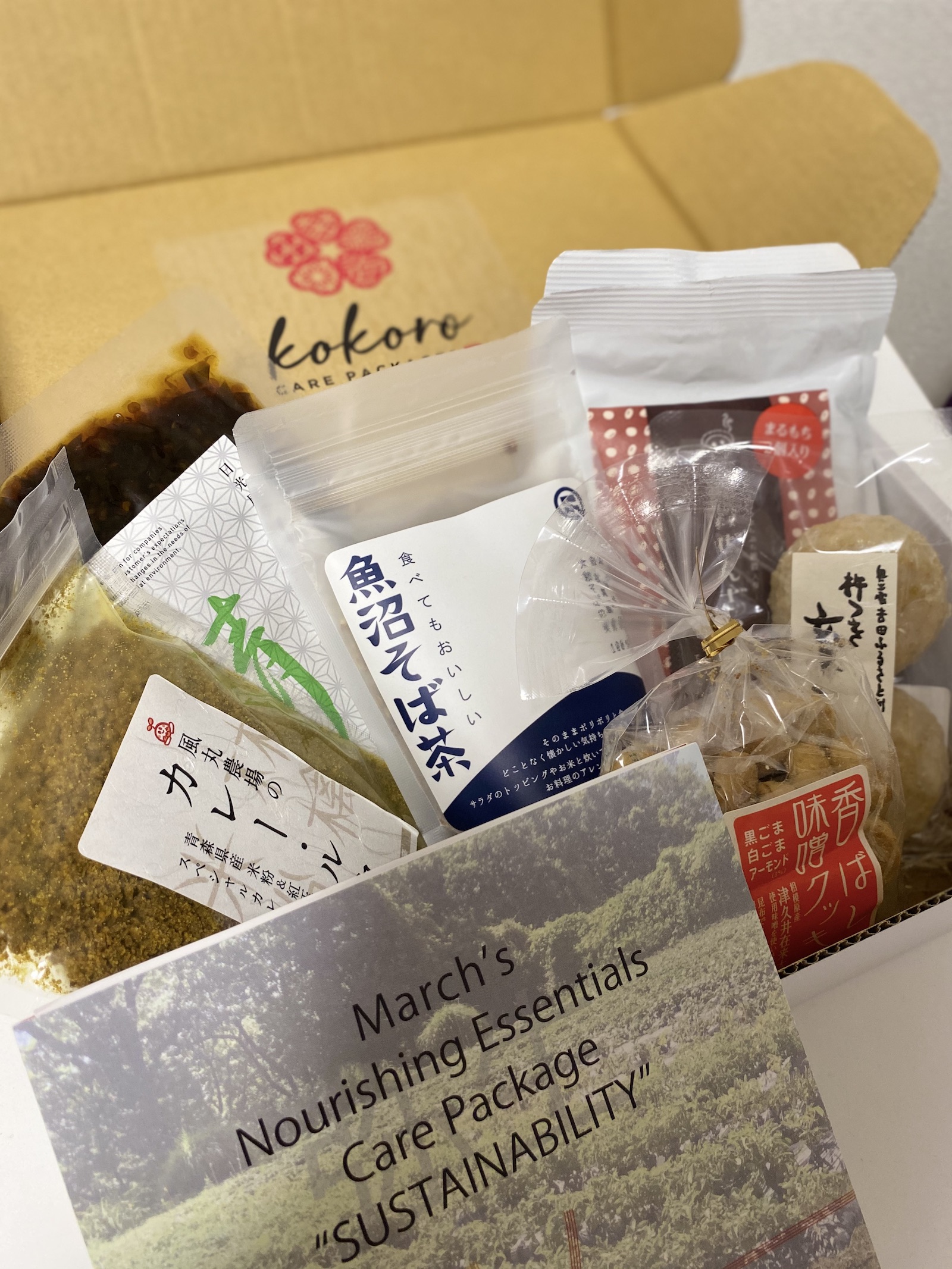
I tried their March Nourishing Essentials Care Package “Sustainability” consisting of Grains Zenzai, Green Pepper Tsukudani, Brown Rice Mochi, Edible Soba Tea, Miso Cookie and Japanese Curry Roux Featuring Aomori Apples - all of which were from various parts of Japan, and each selection ingenious and new to me. My favorite was Edible Soba Tea from Niigata Prefecture, because to have buckwheat seeds by itself for a snack straight from the bag is nutritious and a newfangled notion.
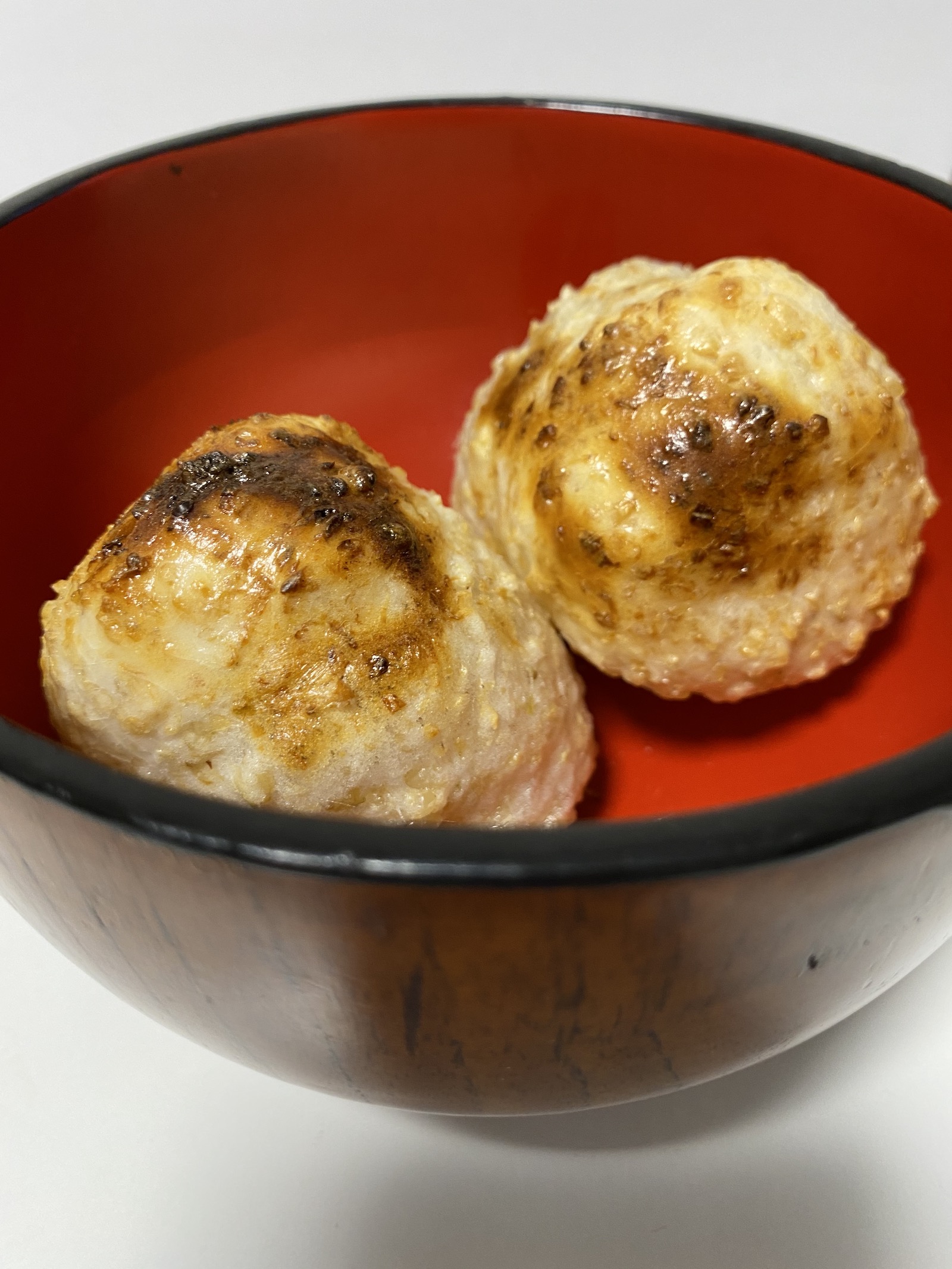
Due to the pandemic, people have been spending more time in the kitchen brushing up on their cooking techniques, so these packages are quite ideal under the current circumstances. I might also add that their calorific intake is lower than that of Western cuisine, making them a healthy way to stay in shape if you haven’t been able to do much exercise.
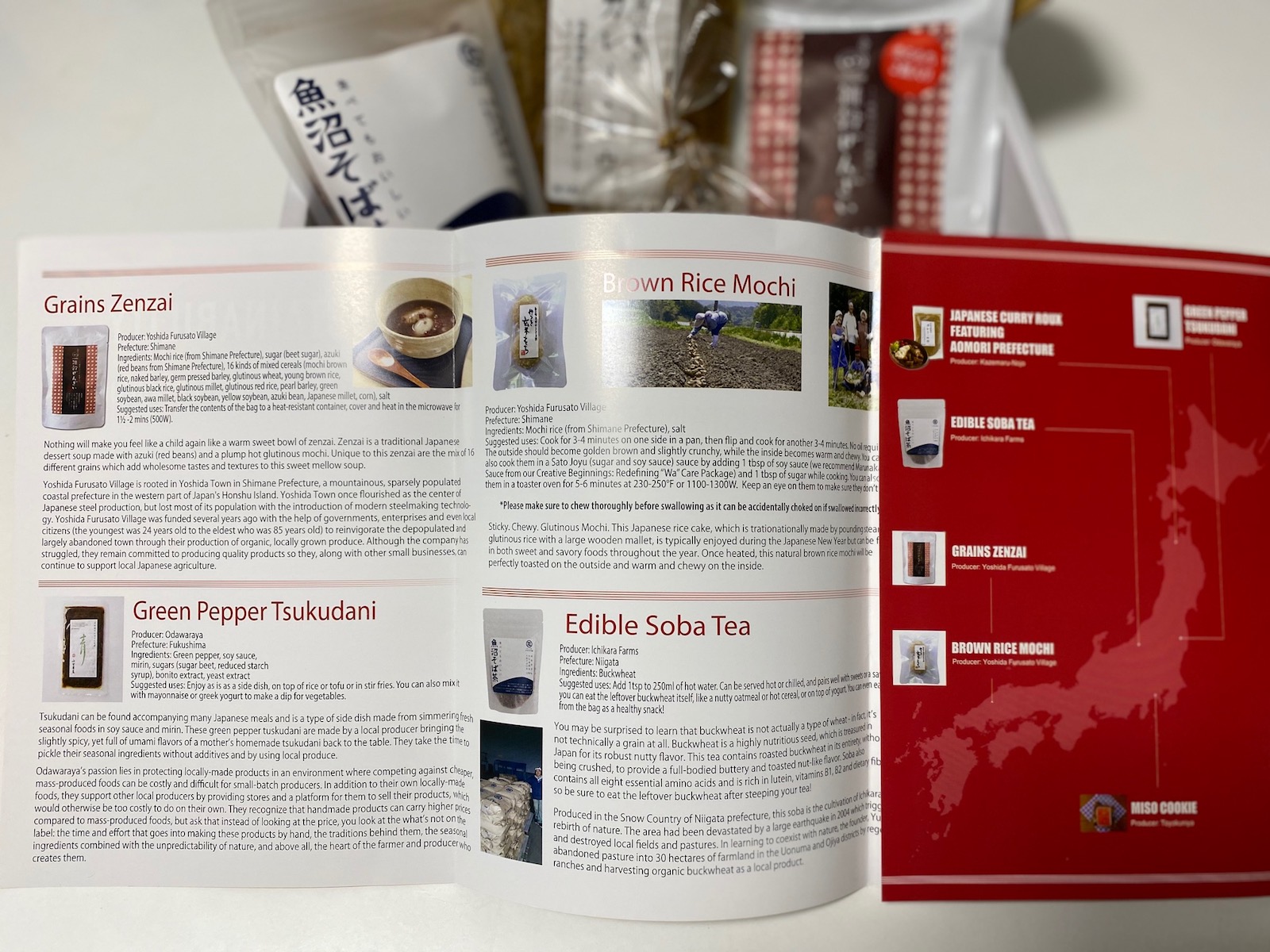
My appreciation for Kokoro Care Packages grew reading the stories behind each product, thoughtfully written on the leaflet. Indeed, it’s precisely a care package from their kokoro. I had the opportunity to talk with Lillian Rowlatt, one of the two founders responsible for the curation of the packages.
You send monthly Nourishing Essentials or Seasonal Delights Care Packages filled with a variety of Japanese flavors. Your customers must be thrilled to receive them on a periodic basis. How did this start?
Our idea began as a way of sharing authentic foods from Japan. As someone who is half Japanese, I grew up enjoying my mother’s home cooked Japanese meals but noticed that a lot of what is available outside of Japan is of lower quality or are very similar, common items. We wanted to share the true dynamic flavors of Japan while introducing people to foods they may not have tried before as well as the stories behind the local farmers and producers we partner with.
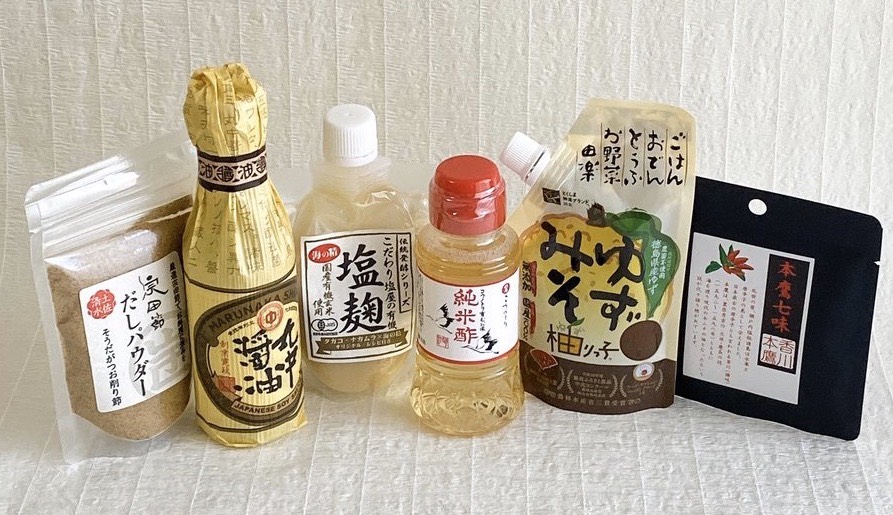
For us, food is more than what’s on your plate but an experience that can connect you to the people around your table as well as the people, land and philosophies that created it.
You’ve traveled nationwide to share produce of local terroir. Milky Oyster Sauce, Hydrangea Tea, pickled flakes… Some of the products are new even to Japanese people. How did you find and select them?
All the credit goes to Aki who individually sources each of our products and connects personally to the farmers and producers who create them. Finding small batch, artisanal products that are free from chemicals is at the core of how we pick our products. We want to find unique specialities that aren’t mass produced and made as traditionally as possible. This is how we believe we should eat and enjoy food. Aki does a lot of research every month to meet producers at expos, farmers markets and through connections to find products that are made with the health of the people and the environment in mind and that showcase the traditions of Japan.
How did you and Aki meet?
Aki and I met when we were both working in finance. A mutual friend introduced us during one of my business trips to Tokyo. He thought we would get along given our mutual backgrounds in finance and our passion for health and wellness. We met over dinner in Tokyo and immediately connected. We kept in touch as I moved to LA and she was the first person to come and visit me. Kokoro Care Packages was born through our conversations about Japanese food and how much we can learn from these traditions.
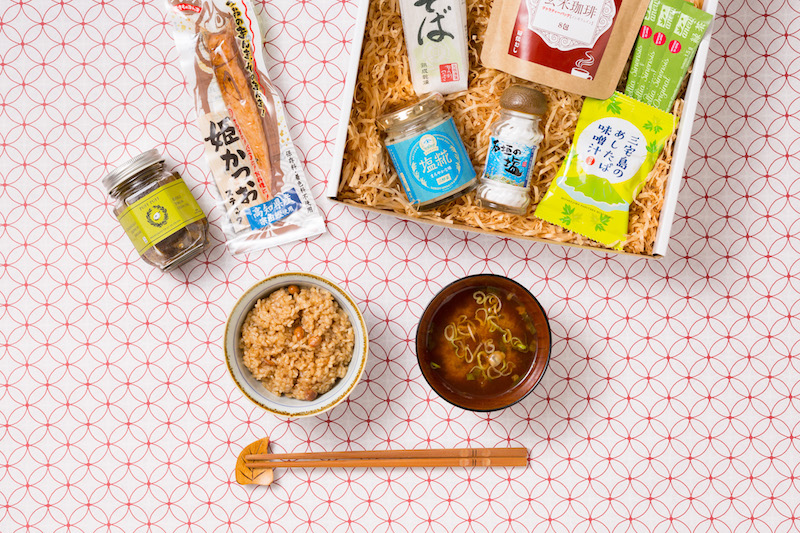
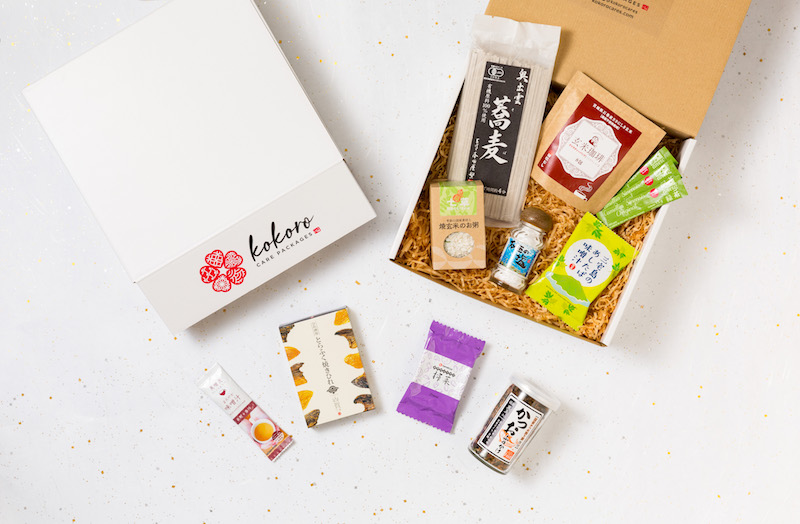
Can you share some unique backgrounds and stories of farmers and producers?
Each of our products has a unique story and background and every month we feel as if we’re connecting to a new community. Some of these local farmers and producers include Yuzurikko, run by a 66-year-old woman who decided to start her own yuzu (Japanese citrus fruit) company in Tokushima. Many of the pesticide-free yuzu were going to waste as aging farmers were no longer able to climb the mountainous slopes to collect them. She has since revitalized the industry by bringing in younger farmers to help with the harvest.
Yasahi Ume Yasan, an ume (Japanese plum) farmer who is one of the less than 1% of ume producers in Wakayama Prefecture to have passed rigorous organic certifications in order to preserve the taste of natural ume for generations to come.
Marunaka, a soy sauce brewer that has preserved their family tools, traditions and even their koji for over 200 years to make a soy sauce that takes three years to brew, with master brewers being the only ones allowed into the brew house, tending to the soy sauce twice daily.
Toyokuniya, a family-run farm that grows a rare domestic soybean known tsukui soybean, which is sweeter and richer than regular soybeans and is the base for many of their creative and delicious products.
And A-Net Farm, an expansive family run farm of over 170 acres located in Hokkaido. It’s been in the family for over 100 years and they make a unique fermented azuki (red bean) spread that contains no added sugar and is naturally sweetened from the fermented beans.
Who is your main target and your best customers so far?
We don’t really have a main target. Our care packages are for anyone who loves Japanese food and culture or wants to explore new tastes and flavors. We also think of our customers as a community of people sharing this passion, from the local farmers and producers to the people overseas.
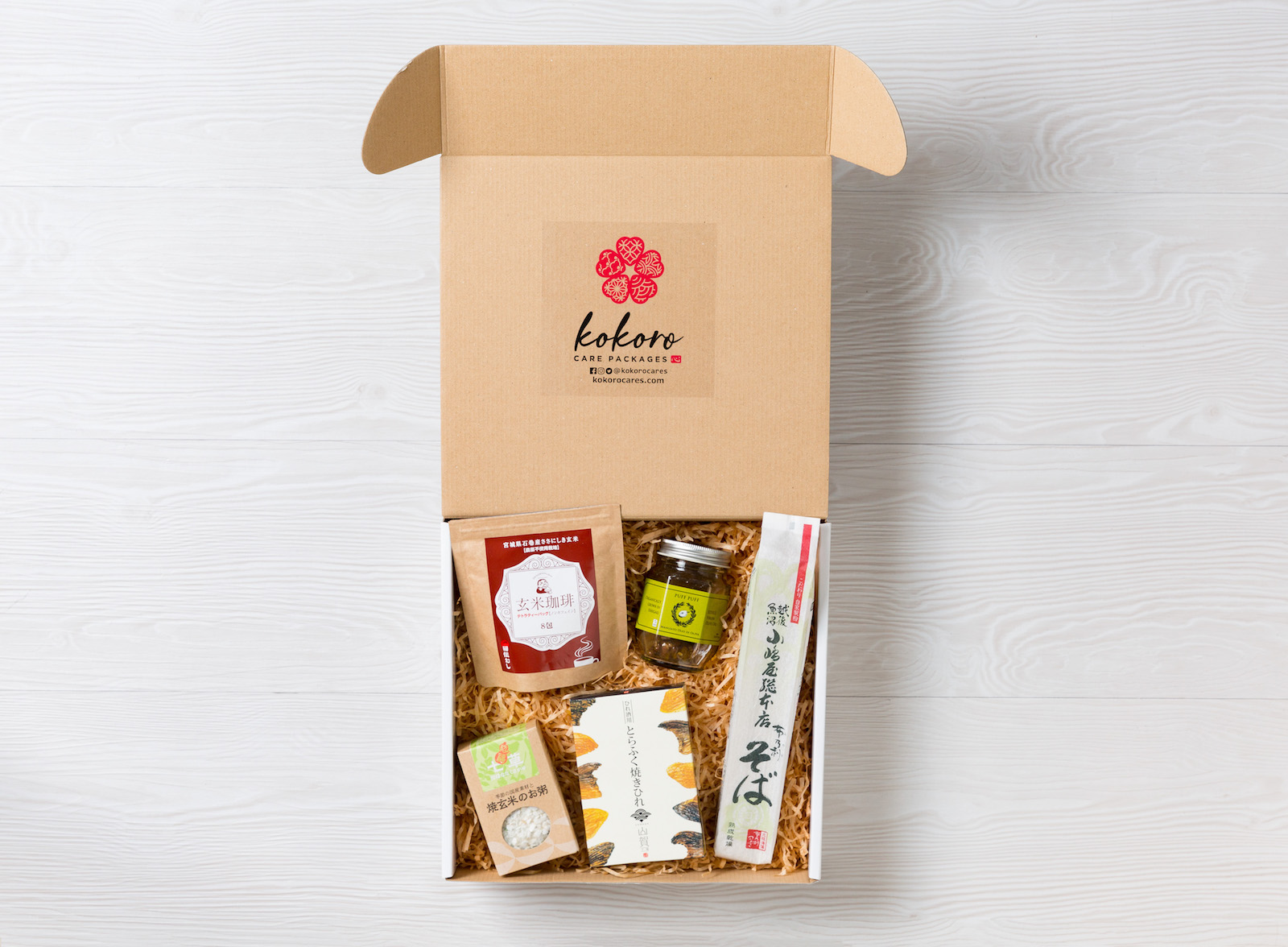
How has the pandemic affected your business?
As for so many businesses, the pandemic has been a challenging time for us. Japan Post, our shipping partner, suddenly announced that they were temporarily suspending shipments to many countries including the U.S. It took a lot of work, but we were able to find an alternative solution and are doing everything we can to ensure that our packages which mean so much to our community can continue to be delivered. Our community has been very supportive given that we truly are in this together. On the positive side, we have noticed more people cooking at home and experimenting with new foods which has resulted in increased interest in our products and packages.
What can we expect in the Tohoku package for June?
We are very excited about our upcoming June Nourishing Essentials and Summer Seasonal Delights theme of Tohoku. This region offers some of Japan’s best agriculture and regional dishes, yet is not heavily visited outside of locals.
We’ll be featuring locally sourced seafood including sanma (saury), saba (mackerel) and hoya (sea pineapple), senbei (rice crackers), akamoku (seaweed) udon, smoked takuan (pickled daikon), brown rice tea (Tohoku is famous for its rice), and more. We don’t want to ruin the entire surprise but people can sign up for our newsletter to learn more about the products we’ll be featuring as we announce them.
I see you collaborated with Mayuko’s Little Kitchen and Miwa’s Japanese Cooking and your recipes on the website look superb. Will you be expanding your business in any way, perhaps with an original cooking class?
We’re always looking for creative ways to expand our business in directions that make sense for both our local suppliers and our overseas community. We actually recently released our first ever Collections Care Package, Creative Beginnings: Redefining “Wa”. This package contains all the basic quality ingredients needed in any Japanese-style pantry. We’ll be launching more of these packages that are available year round with a pre-set list of products. Next up will be a noodle specialty Care Package.
How would you describe “wa”?
Like so many words in Japanese, there’s a deeper meaning behind just the literal translation. Wa or washoku means Japanese/harmony (wa) and food/eat (shoku). Although it can describe any traditional Japanese meal, from the simple to the elaborate, it encompasses the harmony of the tastes and textures on your plate, providing a balance of flavors and nutrients in one meal. It also extends to the harmonious way in which the fresh, seasonal ingredients are prepared, cooked and enjoyed. To me, it’s defined by the true appreciation of food from the seed to the table.
You lived in Niigata Prefecture for a couple of years. What are some things you like most about Japan?
I honestly can’t think of anything I don’t like about Japan. It has such a deep and fascinating culture, the people are so kind and inviting and of course the food is incredible. Lately I’ve been focusing on how much we can learn from the local traditions and philosophies that are at the core of many Japanese traditions - a focus on the community above the individual, taking time to reflect and honor traditions, learning, respecting our elders.
One recent philosophy I was deeply interested in learning about was satoyama - the meeting point of village and mountain which is a metaphor for humans and nature interacting in a way that supports each other, even when it comes to agriculture. I’ve also always appreciated Japanese philosophies around eating - saying itadakimasu before every meal to give thanks to those who helped create the food you’re about to eat, from the farmers and producers to the cook, eating seasonally, focusing on small portions and dishes that provide a wide array tastes and nutrients while achieving harmony on your plate.
What is your favorite Japanese dish?
There are so many. Although I do love a fancy kaiseki meal once in a while, my favorite Japanese foods are the ones made by my mom. Simple, home cooked meals always carry so many wonderful memories. She’d be embarrassed for me to say I love her niku maki - thinly sliced meat rolled around steamed green beans and carrots served with some miso soup and tsukemono (Japanese pickles).
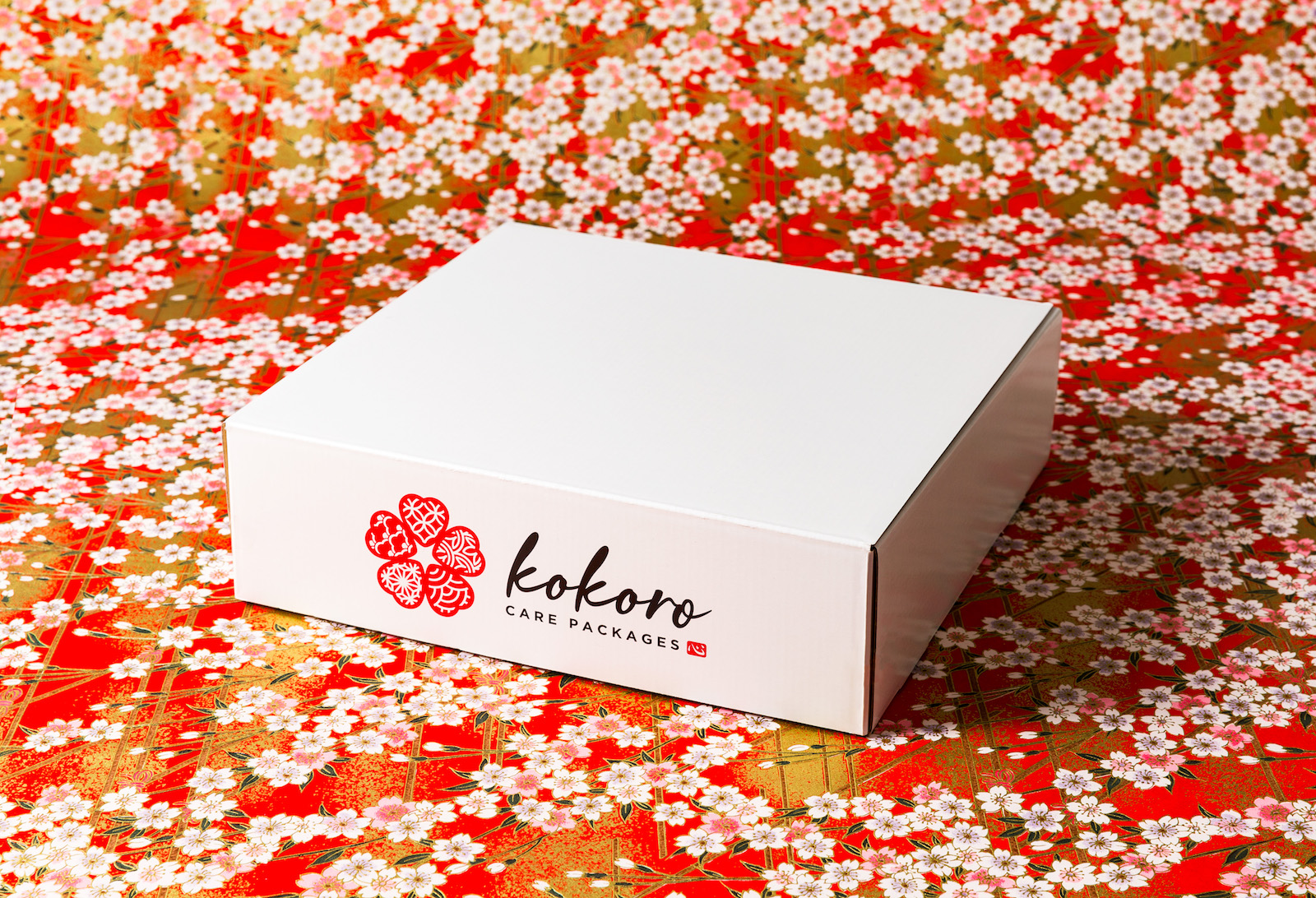
I personally think your sakura logo really describes your business. Did you hire a professional artist?
Thank you. All the credit goes to our designer. We wanted to find something that really represented the true meaning of kokoro and when she designed it we thought it was perfect. Simple Japanese patterns in hearts coming together in a blossoming flower.
For more information, visit https://kokorocares.com
© Japan Today Take our user survey and make your voice heard.
Take our user survey and make your voice heard.




No Comment
Login to comment